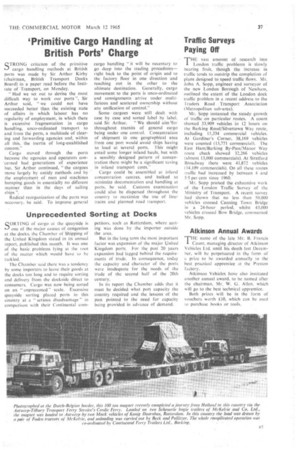'Primitive Cargo Handling at British Ports' Charge
Page 39

If you've noticed an error in this article please click here to report it so we can fix it.
STR 0 N G criticism of the primitive cargo handling methods at British ports was made by Sir Arthur Kirby (chairman, British Transport Docks Board) in a paper read before the Institute of Transport, on Monday,
"Had we set out to devise the most difficult way to work our ports ", Sir Arthur said, "we could not have succeeded better than the existing state of affairs in which labour has no regularity ofemployment, in which there is excessive fragmentation in cargo handling, unco-ordinated transport to and from the ports, a multitude of Clearing and forwarding agencies and, within all this, the inertia of long-established custom."
Cargo moved through the ports because the agencies and operators con'cerned had generations of experience but, Sir Arthur continued, " the cargoes move largely by untidy methods and by the employment of men and machines humping goods in essentially no different manner than in the days of sailing ships ".
Radioal reorganization of the ports was necessary. he said. To improve general cargo handling "if will be necessary to go deep into the trading procedures— right back to the point of origin and to the factory floor in one direction and reaching out in the other to the ultimate destination. Generally, cargo movement to the ports is unco-ordinated and consignments arrive under multifarious and scattered ownership without any unification of control." • Somecargoes were still dealt with case by case and sorted label by label,
said Sir Arthur. We should aim 4or throughout transits of general cargo being under one control. Concentration of shipment to one geographical area from one port would avoid ships having to load at several ports. This might entail some longer inland hauls, but with a sensibly designed pattern of concentration there might be-a significant saving in inland transport costs."
Cargo could be assembled at inland concentration centres, and bulked to minimize documentation and handling at ports. he said. Customs examination could also he dispersed throughout the country to maximize the use. of liner trains and planned road transport.
























































































































